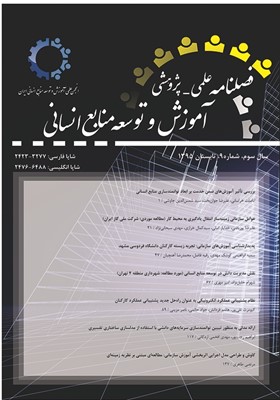کاوش و طراحی مدل اجرایی اثربخشی آموزش سازمانی: مطالعهای مبتنی بر نظریه زمینهای
محورهای موضوعی :
1 - دانشگاه علامه طباطبائی
کلید واژه: آموزش سازمانی, اثربخشی آموزش, انتقال یادگیری,
چکیده مقاله :
هدف این پژوهش ارائه مدلی اجرایی برای اثربخشی آموزش کارکنان و مدیران بود. به این منظور بر مبنای طرح مطالعه کیفی و استفاده از مزیتهای روش پژوهش نظریه زمینهای، از طریق مصاحبه عمیق با کارکنان، مدیران و شرکتکنندگان دورههای آموزشی و مرور مبانی نظری و تجربه آموزش در گمرک و سازمان جهانی گمرک، مدل اجرایی اثربخشی آموزش ارائه شده است. تحليل يافتهها نشان میدهد کارکنان بر مبناي عوامل سازمانی مانند: ماهیت وظیفهای سازمان، مسئولیت اجتماعی سازمان، پویایی سازمانی؛ عوامل شغلی مانند: حساسیت وظیفه، سطح تخصصی بودن وظیفه و سیالیت وظیفه در آموزش و توسعه حرفهاي مشاركت ميكنند. مشاركت آنها در آموزش و يادگيري حرفهاي از طریق: آمادگی فراگیر، انگیزه برای انتقال، ظرفیت فرد برای انتقال، خودکارآمدی عملکردی صورت ميپذيرد. چگونگی تخصیص بودجه، حمایت مدیریت، اسناد بالادستی آموزش، شایستهسالاری و چگونگی اجرای قوانین بستري خاص براي راهبردهاي آموزش کارکنان و مدیران فراهم ميآورند. همچنين راهبردهاي ساختاری: انطباق ساختار با فرایند آموزش سازمانی، ایجاد مجتمع آموزش، ظرفیتسازی انسانی و توسعه ظرفیت؛ راهبردهای نیازسنجی؛ راهبردهای طراحی: تناسب محتوا، مکانیزمهای انگیزشی آموزش، تقویم آموزشی، طرح انتقال؛ راهبردهای اجرا: زمانبندی آموزش، روشهای بینفردی، آموزش بینالمللی و مجازی (Clikc) و راهبردهای ارزشیابی: امتحان، تمرین، نگرشسنجی، تکالیف، سنجش عملکرد متأثر از شرايط مداخلهگر سازماني مانند: جایگاه سازمانی (تأثیرگذاری آموزش در سازمان)، عوامل ساختاری (موازیکاری، یادگیری سازمانی) و مسائل و مشکلات کارکنان (مسائل و مشکلات کاری، فردی، شرایط اقلیمی و رفتارهای سیاسی) هستند. يافتههاي پژوهش نشان داد راهبردهاي اثربخشی آموزش در كنش و واكنش سازنده با عوامل زمينهاي و محيطي پيامدهاي مثبت: بهبود کیفیت خدمات، افزایش منافع مالی و در نهایت شکلگیری یک گمرک یادگیرنده را به همراه خواهد داشت.
This study aims to present an executive model for effective training of employees and managers in the Customs. To this end, the researcher developed an operating model for effective training in the Customs through conducting extensive interviews with the staff, managers and directors and the participants in the training courses and reviewing theoretical foundations and experience in training at the Customs and World Customs Organization. An analysis of the data in three steps of open coding, axial coding and selective coding suggests that the personnel are involved based on organizational factors such as the nature of organizational task, social responsibility of the organization, and organizational dynamics; job factors including task sensitivity, task specialty level, and task fluidity; personal factors such as internal and external motivation in training and professional development. Their involvement in learning through thorough preparation, motivation for transfer, individual capacity for transfer, and effective performance. How to allocate budget, management support, management restrictions, meritocracy, and educational rules and manner of executing rules and laws provide a special ground for training strategies. Moreover, structural strategies including matching the structure with the process of training, creating an training complex, developing human capacity, needs assessment strategies; design strategies including content suitability, motivational mechanisms, instructional calendar, and transfer design; execution strategies including education timing, interpersonal methods, international and online training; and assessment strategies including testing, exercise, attitude analysis, assignments, and effective performance are affected by the organizational factors such as organizational position, structural factors and personnel issues. Research findings indicate that effective strategies for training in the Customs are in positive and constructive interaction with fundamental and environmental factors and will lead to positive effects and consequences such as improved quality of service, increased financial interests and ultimately, formation of a learning customs.
